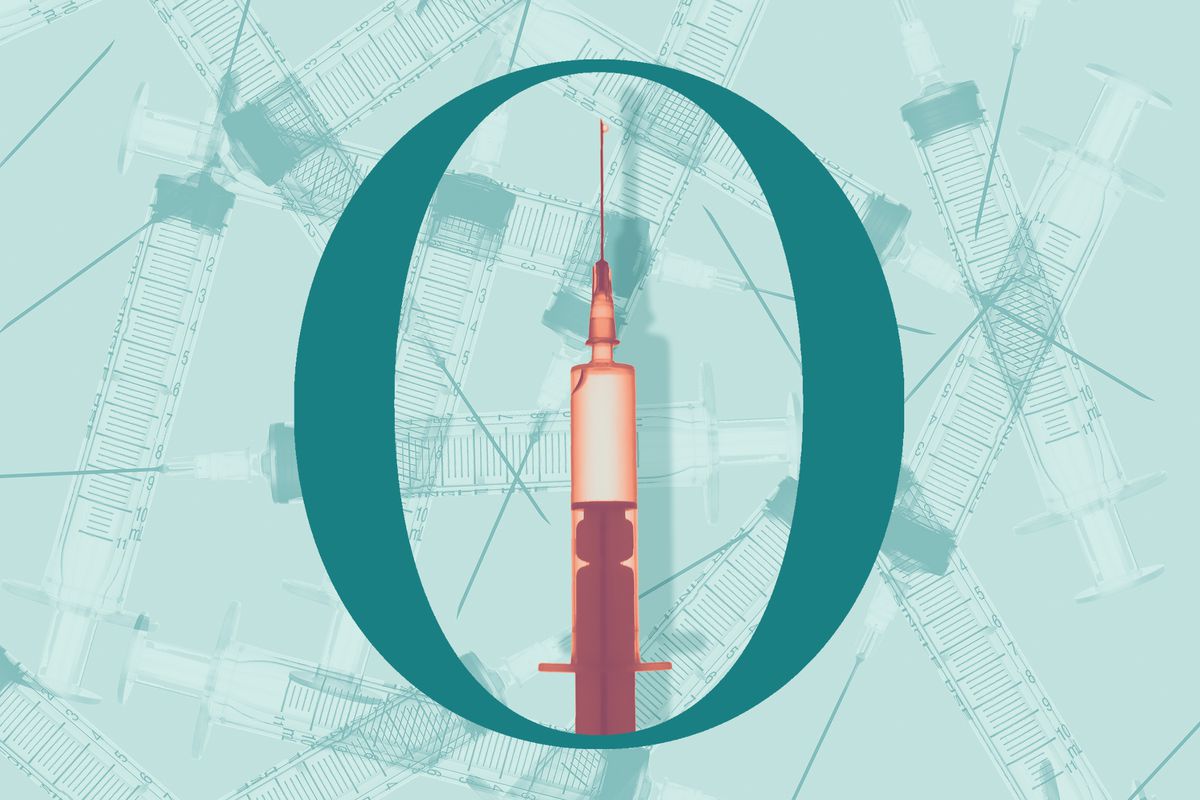
Two new COVID-19 vaccines specifically designed to combat the Omicron variant may be ready soon, one as early as March, according to the CEOs of both Pfizer and Moderna—but the timing of such vaccines has some wondering if they'll be helpful, or even necessary.
Pfizer CEO Albert Bourla shared the news of the company's forthcoming Omicron-specific vaccine on January 10: "This vaccine will be ready in March," Bourla told CNBC's "Squawk Box." "We [are] already manufacturing some of these quantities at risk." A week later, Moderna CEO Stephane Bancel shared similar news that their vaccine "is being finished," and that the company should have data to share with regulators in March as well, according to Reuters.
But with Omicron's quick rise in the US—and now that some areas are already seeing falling case rates—many are wondering if the variant will fade out before shots can go into arms, especially since either Omicron-specific vaccine has yet to be approved or authorized by the proper authorities.
Here, infectious disease and vaccine experts help explain what makes an Omicron-specific vaccine different from the vaccines already in use, and what kind of impact, if any, such a vaccine could have on the global community.
How is the Omicron vaccine different from the vaccines currently available?
The simplest explanation: "It is designed to specifically target the Omicron variant," Kit Longley, a spokesperson and senior manager of global media relations at Pfizer, tells Health.
The Omicron-specific vaccine uses the same mRNA technology other COVID-19 vaccines use—and all mRNA vaccines deliver synthetic genetic material that's similar to the virus they protect against. Because the Omicron variant has at least 50 mutations that differentiate it from the earliest SARS-CoV-2 strain, the Omicron-specific vaccine is expected to contain synthetic genetic material that is slightly different from the original vaccines.
Otherwise, it should work the same way the current mRNA vaccines do, Paul Offit, MD, director of the Vaccine Education Center and professor of pediatrics in the Division of Infectious Diseases at Children's Hospital of Philadelphia, tells Health. The synthetic genetic material that looks like the SARS-CoV-2 virus will trigger an immune response that forces the body to create protective antibodies. Those antibodies will then help prevent the real virus from entering cells and replicating, or causing illness, he says.
Exactly how the Omicron-specific vaccine will be used is yet to be known: It could be used as a primary vaccine or a booster, but those specifics have to be determined by regulatory bodies, once the vaccines are authorized. Another big unknown is whether the Omicron vaccine protect against mild or asymptomatic infection, or whether it will stop infected people from spreading COVID-19 in the event of breakthrough infections.
Will the Omicron vaccines still be useful when they’re ready?
More than 99% of COVID-19 cases in the US are due to Omicron right now, according to CDC data. But, at least in some areas, the variant seems to be on the decline: The New York Times reported on Wednesday that new cases in the some states, like New Jersey and New York, have dropped by 30%; while other states, like Colorado, Pennsylvania, and Georgia have seen cases drop by 10%. And although the variant hasn't peaked nationwide yet, it could happen in the coming weeks.
"We don't know what will be happening by the time March comes around and if we'll still need the Omicron vaccine," Abinash Virk, MD, an infectious disease expert at the Mayo Clinic, tells Health. "But if we switch from the current Pfizer vaccine to the Omicron one in March, it won't be a loss since there are still so many people who haven't had primary vaccines or boosters."
But for now, Dr. Offit insists the current vaccine options—especially when supplemented by booster doses—are more than sufficient. Though Omicron has brought on more breakthrough cases that other variants due to its increased ability for immune evasion, existing vaccines still effectively protect against us severe illness, hospitalizations, and deaths, according to the CDC. That means more vaccine compliance overall would still lead to less illness—even without an Omicron vaccine. "We can vaccinate our way out of this pandemic—but to date, we have chosen not to," Dr. Offit says. "The pandemic has always been a pandemic of the unvaccinated. But now it's a pandemic of the willfully unvaccinated."
Will we need other variant-specific vaccines in the future?
No one has an answer to that yet. Experts largely agree that so long as individuals refuse vaccination, COVID-19 is likely to keep mutating—meaning the Omicron variant may not be the last variant we see. According to Longley, though the Omicron-specific vaccine offers protection against previous variants like Delta, Pfizer does not know whether it will provide protection for the next variant that might pop up.
That said, there's no consensus that any variant-specific vaccine is necessary in this moment. "We'll need a variant-specific vaccine when what we have fails to protect us against serious illness," says Dr. Offit, who's not convinced the time is now. "Just because vaccination doesn't protect against mild or asymptomatic infection doesn't mean you need a variant-specific vaccine. The original vaccines were designed for the SARS-CoV-2 virus as it left China. It's been replaced by Alpha, Delta, Omicron, and Beta in some areas. But in every case, vaccine protection from serious illness has held up."
That's not to say it's time for vaccine manufacturers to put their feet up. On January 11, the World Health Organization called for current COVID-19 vaccines to be reworked to ensure they are effective against Omicron and future variants. "A vaccination strategy based on repeated booster doses of the original vaccine composition is unlikely to be appropriate or sustainable," the organization said in a statement.
The holy grail, Dr. Virk says, would be a single-dose vaccine that provides blanket coverage from the SARS-CoV-2 virus and its mutations forever. "I don't know if we'll ever find one," she says. "But if we can get more people protection and immunity, fewer variants will emerge so we won't have to update the vaccines so frequently."
In the meantime, experts agree that the Omicron vaccine isn't going to be the thing that ends the pandemic; only widespread adoption of vaccines—any COVID vaccines, really—will do that.
The resounding message here is to act now. "You shouldn't be waiting for the Omicron vaccine or any other pot of gold at the end of the rainbow," Dr. Virk says. "Every study, country, research institution, and public health agency agrees that two doses of an existing vaccine are better than nothing and three doses are protective against hospitalization and death. The vaccinations we have are now are incredibly effective and safe."
The information in this story is accurate as of press time. However, as the situation surrounding COVID-19 continues to evolve, it's possible that some data have changed since publication. While Health is trying to keep our stories as up-to-date as possible, we also encourage readers to stay informed on news and recommendations for their own communities by using the CDC, WHO, and their local public health department as resources.
Source: Read Full Article
